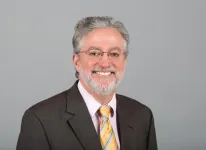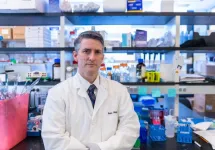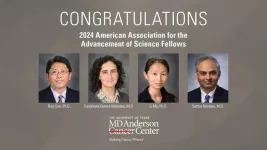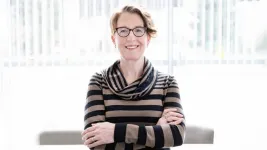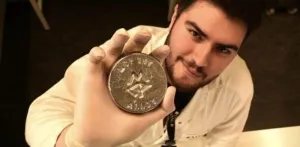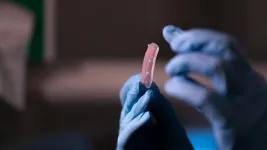(Press-News.org) University of Utah Health professors Amy Barrios, PhD, and H. Joseph Yost, PhD, have been elected as Fellows of the American Association for the Advancement of Science (AAAS), a lifetime honor that celebrates their excellence in research and commitment to mentoring the next generation of scientists.
Yost and Barrios join a distinguished cadre of AAAS Fellows at the U, including Nancy Songer, PhD; Thure Cerling, PhD; Vahe Bandarian, PhD; Eric W. Schmidt, PhD; Jennifer S. Shumaker-Parry, PhD; and Mario Capecchi, PhD.
Rachel Hess, MD, associate vice president for research at U of U Health, says, “The election of Dr. Barrios and Dr. Yost to fellowship of the AAAS recognizes their extraordinary contributions to their disciplines and the future generation of scientists. We are thrilled for them to join the six AAAS members in the University of Utah community.”
This year’s cohort of 502 fellows will be celebrated at a forum in Washington, D.C. in September 2024, as well as being featured in the AAAS News & Notes section of Science in April 2024.
Amy Barrios
Barrios, professor of medicinal chemistry in the College of Pharmacy, was elected “for distinguished contributions enabling the therapeutic targeting of mammalian protein phosphatases, for mentoring, and for service to the community.”
“This is an amazing honor to be nominated and elected as a fellow of the AAAS, but it also recognizes the amazing work that my graduate students, postdocs, and collaborators have done,” Barrios says.
Barrios’ research focuses on a group of enzymes called protein phosphatases, which are essential for a vast array of biological processes. Her lab builds tools to learn about the roles these enzymes play in health and disease. She explains, “These enzymes are involved in diseases ranging from cancer and autoimmunity to metabolic disease and substance use disorders, so there’s lots of interesting therapeutic potential applications.”
Barrios also investigates how metal ions, especially drugs that include gold ions, work in the body and explores how gold-based drugs can be used to treat parasite infections like dysentery and toxoplasmosis.
Barrios’ selection as a fellow of the AAAS also honored her commitment to mentoring. “Something I’ve worked really hard on over my career is mentoring and creating spaces on campus where people from diverse backgrounds can be successful in their careers on their own terms,” she says. “It’s really important for everyone’s voice to be heard and to be able to have everyone contribute to science so that we get much more diverse perspectives and more diversity in what we explore scientifically.”
H. Joseph Yost
Yost, professor of neurobiology and anatomy in the Spencer Fox Eccles School of Medicine, vice chairman for basic science research in pediatrics, and Richard L. Stimson Presidential Endowed Chair, was elected “for distinguished contributions by an exceptional individual who possesses a unique combination of research expertise, leadership skills, and a dedication to mentoring the next generation of scientists.”
“We ask a fundamental biology question of how the left side of the body is built differently than the right side of the body, which segued into our interest in how the heart is built,” Yost says. To function properly, the heart of a developing embryo needs to transform from a symmetrical tube into an asymmetrical knot. Changes in this process can lead to congenital heart disease.
Yost’s endeavor to understand heart development relies on a positive feedback loop between clinical and basic science. Yost works with pediatricians and genomics experts to understand the genetic differences of congenital heart disease patients. Back at the bench, he uses model organisms like zebrafish and frogs to understand how those genes drive heart development.
As the director of three training grant programs, Yost is committed to mentoring future biomedical scientists. Of one of these programs, Genomics Summer Research for Magnificents (GSRM), Yost says, “These are magnificent students that come from all over the country, from a variety of different backgrounds, and we often give them their first lab experience and get them excited about getting into science… It’s a really exciting time to be a mentor for the next generation.”
END
Two U professors selected as AAAS fellows
2024-04-18
ELSE PRESS RELEASES FROM THIS DATE:
Dana-Farber Chief Scientific Officer, Kevin Haigis, PhD, elected as Fellow of the American Association for the Advancement of Science
2024-04-18
Boston - Kevin Haigis, PhD, Chief Scientific Officer, Dana-Farber Cancer Institute, has been named Fellow of the American Association for the Advancement of Science (AAAS). Election as an AAAS Fellow is a distinguished lifetime honor bestowed upon AAAS members by their peers.
Haigis is recognized within Biological Sciences for his distinguished contributions to understanding the complex diversity of cellular dysregulation by different variants of RAS mutations and their consequences in pathophysiology and ...
Siblings with unique genetic change help scientists progress drug search for type 1 diabetes
2024-04-18
Two siblings who have the only known mutations in a key gene anywhere in the world have helped scientists gain new insights that could help progress the search for new treatments in type 1 diabetes.
Type 1 diabetes (also known as autoimmune diabetes) is a devastating and life-long disease, in which the patient’s immune cells wrongly destroy the insulin producing beta cells in the pancreas. People living with autoimmune diabetes need to test their blood sugar and inject insulin throughout their lives to control their blood sugars and prevent complications.
Autoimmune ...
Four MD Anderson researchers elected AAAS Fellows
2024-04-18
HOUSTON ― In recognition of their significant achievements in the realm of cancer care and research, four researchers at The University of Texas MD Anderson Cancer Center have been elected fellows of the American Association for the Advancement of Science (AAAS). This prestigious distinction stands as one of the highest accolades within the scientific research community.
Boyi Gan, Ph.D., Candelaria Gomez-Manzano, M.D., Li Ma, Ph.D., and Sattva Neelapu, M.D., now join this esteemed group of fellows elected by their peers. AAAS’s annual tradition of recognizing leading scientists as fellows dates to 1874. With these newest additions, 68 MD Anderson faculty members ...
Computational biology pioneer Katie Pollard elected as AAAS fellow
2024-04-18
SAN FRANCISCO—April 18, 2024—The American Association for the Advancement of Science (AAAS), one of the world’s largest general scientific societies, has elected Gladstone Senior Investigator Katie Pollard, PhD, into its new class of AAAS Fellows, a lifetime honor within the scientific community.
AAAS recognized Pollard for her “distinguished contributions to the field of computational biology and bioinformatics, particularly her discovery of Human Accelerated Regions, and development of ...
New “window-of-opportunity” clinical trials explore cutting-edge treatments for cancers of the liver, head and neck
2024-04-18
April 18, 2024, TORONTO – A new round of clinical trials supported by the Ontario Institute for Cancer Research (OICR) will harness a unique opportunity to test some of the newest treatment strategies for a range of different cancers.
OICR has announced two new clinical trials as part of its Window-of-Opportunity (WOO) Network, which brings together Ontario researchers, clinicians and patients to study the biology of newly diagnosed and recurrent tumours.
“‘Window-of-opportunity’ clinical trials take advantage of the two-to-eight-week period between the diagnosis of cancer and the surgery to remove the cancer, at ...
Can bismuth prevent oil leaks – (and save Norwegians billions)?
2024-04-18
Over the next 25 years, as the world shifts away from fossil fuels, the oil and gas wells that have sustained the fossil fuel age will have to be plugged.
No big deal, you might think, drilling those wells was the hard part. Plugging them should be no problem. But think again.
The Norwegian Continental Shelf, as an example, is punctured by more than 2000 wells. Harald Linga, centre director for SWIPA (see box), a Centre for Research Based Innovation based at SINTEF, Scandinavia’s largest independent research institute, estimates that plugging them using today’s technology will cost upwards of NOK 800 billion – that’s USD 73 billion.
And while oil ...
Atmospheric isotopes reveal 4.5 billion years of volcanism on Jupiter’s moon Io
2024-04-18
Sulfur and chlorine isotopes in the atmosphere of Jupiter’s moon Io indicate that it has been volcanically active for the entire 4.57 billion-year history of the Solar System, according to a new study. The findings offer new insights into the moon’s history. Io is the most volcanically active body in the Solar System. This extreme level of volcanic activity is the result of tidal heating from friction generated within the moon’s interior as it is pulled between Jupiter and its neighboring moons of Europa and Ganymede. However, how long Io has hosted such extensive ...
An ink for 3D-printing flexible devices without mechanical joints
2024-04-18
For engineers working on soft robotics or wearable devices, keeping things light is a constant challenge: heavier materials require more energy to move around, and – in the case of wearables or prostheses – cause discomfort. Elastomers are synthetic polymers that can be manufactured with a range of mechanical properties, from stiff to stretchy, making them a popular material for such applications. But manufacturing elastomers that can be shaped into complex 3D structures that go from rigid to rubbery has been unfeasible until now.
“Elastomers are usually cast so that their composition cannot be changed in all three dimensions over short length scales. To overcome ...
Association for Chemoreception Sciences (AChemS) 46th Annual Meeting
2024-04-18
Media Contact:
Dr. Alissa Nolden, Chair - Public Information & Affairs Committee, anolden@umass.edu
Bonita Springs, FL— The Association for Chemoreception Sciences (AChemS) stands as a premier organization dedicated to advancing the understanding of chemosensory systems. With a rich history spanning over four decades, AChemS has played a pivotal role in fostering interdisciplinary research and collaboration in the fields of taste, smell, and chemical senses. AChemS provides a platform for scientists, clinicians, and industry members from diverse backgrounds to exchange ideas, present cutting-edge research findings, and address pressing challenges ...
How the Birmingham Drug Discovery Hub created an investment-ready ‘drug library’
2024-04-18
A novel approach to drug discovery is enabling University of Birmingham researchers to overcome the ‘valley of death’, where projects fail due to the funding gap between original research and commercial investment.
The approach, detailed in a feature published in the April issue of Drug Discovery Today, has attracted more than £4m in industry funding, grants and industry awards, on the back of just £0.2m investment from the University’s Dynamic Investment Fund (DIF).
The Birmingham Drug Discovery Hub ...
